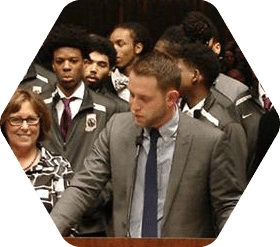Political Science outside the Classroom
Internships and Complementary Learning
Students majoring in political science are encouraged to take courses in each of these subfields and to continue their learning outside the classroom through internships, either locally or with a national or international organization. Internships in the past have often been undertaken either during the summer months or over the college’s winter term in January. These internships provide students with an opportunity to complement their in-class work with actual field experience relevant to their degree program. Students with an interest in international or comparative politics will normally take advantage of one or more of the college’s excellent study abroad programs for winter term, one semester or the whole academic year. For these, be sure to consult the link on this page for study abroad, as well as the website for Eckerd College’s International Education programs.
For students interested in service learning opportunities or domestic internships, please contact the The Center for Career Planning and Applied Learning for more information. In conjunction with the London Study Centre, students interested in an internship with a Member of Parliament in the UK as a part of the Global Eyes program should contact the International Education office and Professor Tony Brunello, who serves as the sponsoring professor in such cases.
For internships for credit, the student will need to fill out an internship form found in the registrar?s office and seek out a sponsoring professor with expertise in the area of the desired internship, and the student will be responsible for any tuition costs and requisite academic requirements (ie, journals, readings, papers, etc.) the sponsoring professor may require.
Career Objectives
Majoring in political science helps prepare students for careers such as law, teaching, government and non-governmental organizations, international organizations, think-tanks, journalism, business and further work in graduate school.
Government
Almost three million civilian, federal employees are found in virtually every kind of job common to the private sector of the economy. Employment opportunities are even broader below the federal level, where more than ten million people are working for state and local governments. Moreover, career opportunities exist with public and private international agencies focusing on development in the lesser developed countries, the global environment, human rights and other issues of international concerns such as education, health, food and population, and conflict resolution.
Non-Governmental Organizations, International Organizations, Think-Tanks
A political science major can be an important first step in an exciting career in non-governmental organizations, (NGOs), international organizations (IO’s), and/or think tanks as well. NGO’s such as Greenpeace, Amnesty International, and the National Organization for Women have an increasingly vocal, visible and important role in policy-making and opinion-shaping in domestic and international politics; as do IO’s such as the United Nations, the World Trade Organization, and the Association of Southeast Asian Nations; and think tanks such as the Heritage Foundation, the CATO Institute, and the Brookings Institution.
Law
A political science major can also be a stepping stone to a career in law. Most lawyers are engaged in private practice, either alone or in firms of two to hundreds of associates. Some are salaried employees of corporations, unions, the government and/or trade associations. Others become involved in corporate management, public administration and politics. A few become teachers and judges. Law school is not required for careers as a legal assistant or paralegal. For information on Eckerd’s Pre-Law option, follow the following link (Eckerd Pre-Law).
Business
Many political science graduates enter business careers in the fields of personnel, marketing, public relations, risk assessment, banking and finance. A number of management training programs in private corporations hire bright graduates with well-rounded, liberal arts educations and provide on-the-job training.
Journalism
Since much of the content of the modern media deals with public affairs, the study of political science at both the national and international levels is an excellent preparation for a career in journalism as well, whether that be in print media such as the New York Times, in web-based media such as CNN.com, in radio media such as National Public Radio, or in television media such as ABC or Fox News.







